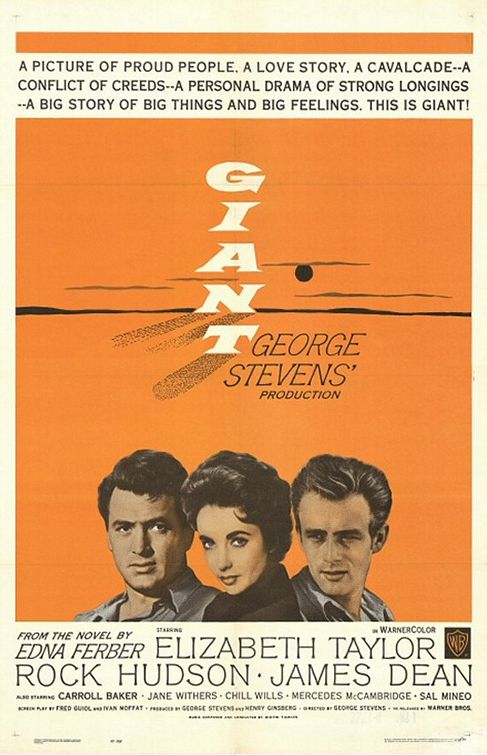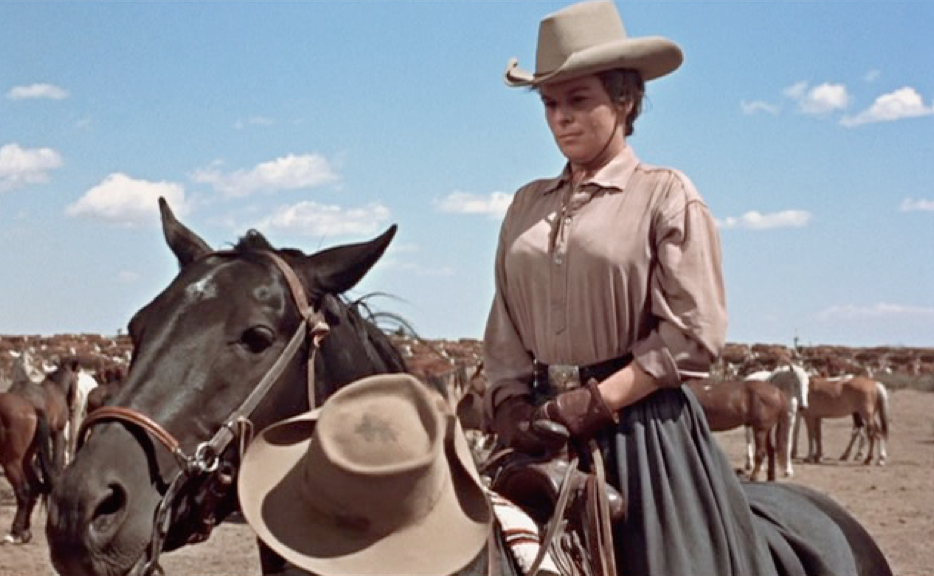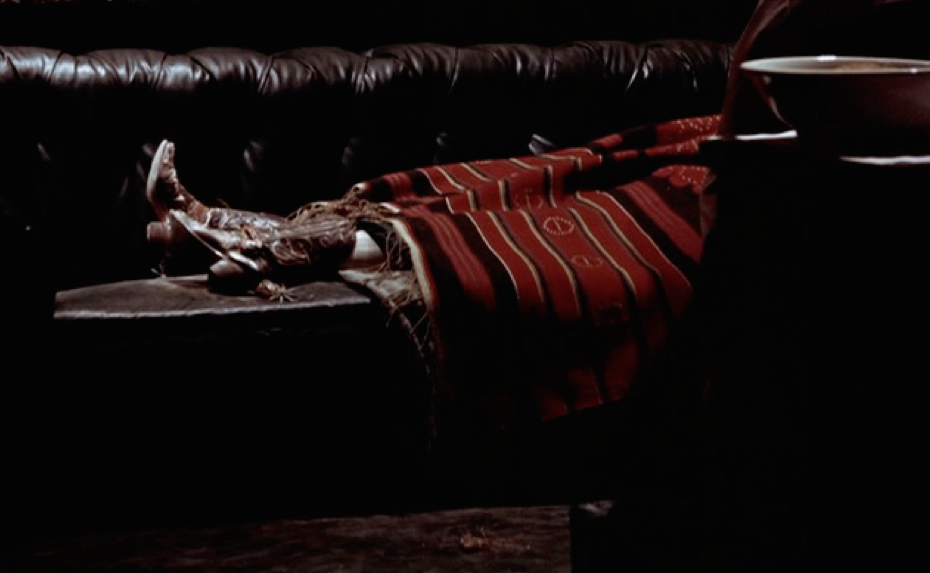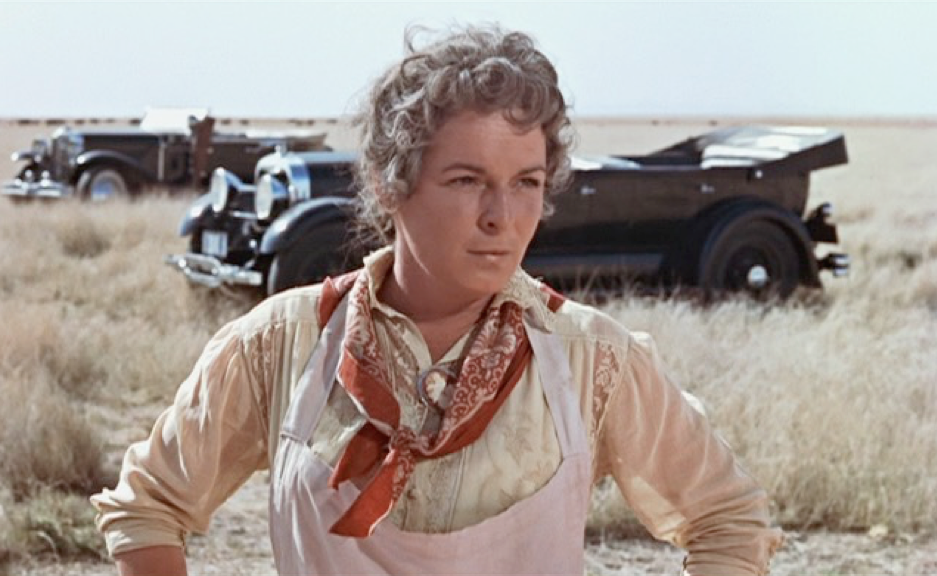Mercedes McCambridge: Giant (1956)
 Saturday, March 12, 2016 at 12:12PM
Saturday, March 12, 2016 at 12:12PM  Our second chapter of the Centennial Mercedes McCambridge celebration is also the second time Oscar celebrated her. She received her second and final nomination in Best Supporting Actress for Giant, a massive epic about social discrimination affecting a wealthy Texas ranching family. Here she's playing opposite massive stars Elizabeth Taylor, Rock Hudson, and James Dean (his final performance), but McCambridge still lingers over the film after her staunch matriarch Luz Benedict departs. She has perhaps only twenty minutes of screentime at the start of the film's sprawling length, it's a brief performance that the actress makes both broad and oddly complete.
Our second chapter of the Centennial Mercedes McCambridge celebration is also the second time Oscar celebrated her. She received her second and final nomination in Best Supporting Actress for Giant, a massive epic about social discrimination affecting a wealthy Texas ranching family. Here she's playing opposite massive stars Elizabeth Taylor, Rock Hudson, and James Dean (his final performance), but McCambridge still lingers over the film after her staunch matriarch Luz Benedict departs. She has perhaps only twenty minutes of screentime at the start of the film's sprawling length, it's a brief performance that the actress makes both broad and oddly complete.
You might call her performance wooden or inexpressive if you've never experienced this kind of woman in real life. The stoic inexpressiveness and static undercurrent of rage is eerily familiar if you're accustomed to this brand of southern woman, one who has been toughened up by a man's world and educated to hate. McCambridge respects the deliberate unknowability with which Luz wants to greet the world - this is a woman who has thrived on not letting anyone in to subvert her authority. She wears Luz's hatred (and self hatred?) like an impenetrable shield of armor, as her eyes offer the only suggestion of more brewing underneath the facade. More...
McCambridge had spoken of the toll taken on her by the hardened women she had played, and it's all right there in her weathered face. McCambridge's radio work might be the root of her being foremost praised for her vocal specificity, but her work in Giant is physically well-observed and smartly muted.
Luz is purposefully presented plainly against the star wattage glamour of Taylor's Leslie, but you sense the actress also modulating physically against the movie star. McCambridge thick dialect is flat against Taylor's vivid delivery, and McCambridge barely moves compared to Taylor's grace. Her behavior establishes the threat Luz sees on the arrival of her new sister-in-law and her ideas of acceptance, while remaining true to a woman not prone to physical flourish. Luz claims to hold sway with her Mexican farmhands with brute verbal control, but the actress does so with stillness during her brief screentime. There are no fireworks coming from their tension, for outright argument would mean that somehow Luz has already lost a piece of control.

That attempt at control is ultimately Luz's downfall as she forcefully tries to prove her dominance over the Mexican ranch hands she despises by riding the wildest horse. She's thrown from the horse impersonally off-screen, simultaneously losing both her battle for dominance and her individuality. In her death, director George Stevens shows the power of our hatred to define us over any other characteristic once we're gone. But it's McCambridge doing the character building to make sure the thesis sings.
Ultimately, we're left with the internally unknowable within McCambridge's portrayal of Luz to tantalize us most. She enters the film unceremoniously, and exits just as visually insignificant, her cruelty robbing her of her own humanity. It's the frustrating experience of a compelling actress drawing the audience in just enough, but also working in tandem with the film to support the narrative by keeping us at arm's length. It's also a reminder and warning of what hatred can do to a person and their legacy - render them inert in life and insignificant in death.

Previously: an Oscar win for All the King's Men (1949)




Reader Comments (13)
Wow, this is a beautiful piece Chris. I love that it's so focused because damn that's a sprawling epic. (but a great one)
especially like the precision with which you've summed up how well the movie uses her as such as cornerstone of its dialogue with time and legacy and prejudice.
Very nice in-depth look at this performance. She does show what she can of the unknowable Luz. Even in the book Luz was very closed off, the only things you really knew about her was her love for Jett Rink and Bick and her hatred of Leslie which is softened in the film to more agitation at her disrupting her way of life. Leslie hated Luz as well though in a more refined, internalized way.
Not that she doesn't give a fine performance but I think this is a tagalong nod, there were richer performances that could have taken her slot though no one could have topped winner Dorothy Malone's she cat Marylee in Written on the Wind. Between All the King's Men and this she gave two interesting performances, beside the florid Emma Small in Johnny Guitar, in Lightning Strikes Twice and The Scarf.
Nathaniel - she has so little time but really makes a mark on the film, and I'd argue because she's such a blunt force
Joel6 - I like the performance, but I might agree with you slightly because getting nominated with this little screentime (it seems like she has even less when the movie is days long) is tough
My favorite perf from GIANT
For me, she stands out in Suddenly Last Summer surrounded by 3 huge stars.
Giant is one of the best films of the 50s. Stevens did such brilliant work in that decade. McCambridge cuts a formidable presence here. Supporting Actress was impressive that year. I haven't seen Mildred Dunnock but I really like Eileen Heckart--so fantastic in The Bad Seed. Rita Moreno should have been cited for The King and I.
Speaking of Giant, its weird that Hudson, Dean & McCambridge all got nom but Taylor got snubbed!!?? I felt she was the best thing is this overlong epic
IMO, McCambridge was so-so here, Johnny Guitar & Suddenly Last Summer wld be a betta 2nd nom for her.
Given a chance, I wld've replaced Hepburn in The Rainmaker w Taylor in best actress race, & McCambridge w Hayes for her regal Dowager Empress in Anastasia in best supp
Helen Hayes is great in that role! The scene in which she meets Bergman/Anastasia is the strongest of the movie. I agree that she should have been in Oscar contention, even if not necessarily filling Mercedes spot
Luz is also trying to assert her dominance by riding that horse because it is Leslie's horse...and Luz loses.
I also like the way Luz/Mercedes haunts this film after she's off-screen. The most intriguing is when one character casually mentions that Luz was in love with her "stray" ranch hand, Jett Rink.
Despite some latter day criticism that "Giant" is an overlong soap opera (so what?!), I love the fact that this movie, made in the conformist '50s, addresses capitalism, race, and feminism in an intelligent way, within the realm of a Hollywood epic.
Yes, she's fantastic! But her performance is so short! If only she had a couple of minutes more screen time, she'd be my choice for sure. But I still have to go with Dorothy Malone, who, in typical fashion for the Supporting Actress category is really a co-lead.
My overall choice for the year, however would be Katie Johnson for The Ladykillers.
This is a great post Chris. I don't know why Giant isn't more loved. Although it's really long and and perhaps a bit meandery, it is very gripping. I think it's better than Gone with the Wind.
You give some great insight into a very enigmatic character. Mercedes McCambridge was a good actress, though I thought that she could be a little brittle at times and I couldn't exactly get a read on her. Other than Dorothy Malone, the supporting actress nominees were disappointing.
I think that Jennifer Jones in The Man in The Gray Flannel Suit, Marie Windsor in The Killing, Anne Baxter in The Ten Commandments would have been more deserving than McCambridge.
Adam, thanks for mentioning Jennifer in TMITGFS. She's simply extraordinary in that part.
Elizabeth Taylor should have been nominated for Giant--she easily could slip into that slot held by Nancy Kelly, who is quite bad in The Bad Seed. I would take away the nomination for Butterfield Eight, even though she's quite good, but I would give that slot to Jean Simmons in Elmer Gantry. That way, Liz still has her four consecutive nods, which is quite an impressive feat.
brooksboy, I agree that Jean Simmons should have been nominated for Elmer Gantry in either lead or supporting.
I liked Nancy Kelly in The Bad Seed. I thought she did an amazing job at showing the complete breakdown her character was facing, learning about her diabolical daughter. She seemed to be the only one giving a cinematic performance in a creaky, stage-bound adaptation. Out of the 5 nominees that year I would have given her the prize.